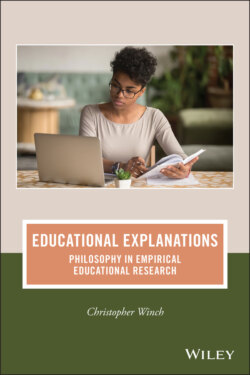Читать книгу Educational Explanations - Christopher Winch - Страница 6
Foreword
ОглавлениеIt is no secret that enquiry into education has been dominated for several decades by empirical research. For many this has extended into an ideology of empiricism, the belief that it is only through empirical research that education can be studied. The harm that is done by this ideology lies not just in its substantive misconceptions but in its effects on research methods courses and on the forms, structures, and protocols within which educational research proposals are formulated and funding granted. This has squeezed and distorted enquiry into education originating in the humanities, not least in philosophy.
For its part, however, and in reaction perhaps, philosophy of education has tended to distance itself from this mainstream. But its justifiable honouring of its disciplinary principles and commitments has sometimes carried with it an air of superiority, if not of muted disdain – and clearly this will not do. There is a fundamental importance to philosophical questions regarding education, but if these are addressed without due cognizance of the realities of educational practice, there is a danger that enquiry will drift off into vague speculation and lose its footing in the rough ground of experience.
Now it would be facile to assume that empirical educational research has a secure footing in this way simply in virtue of its adoption of empirical methods. Research methods sometimes involve templates of assumption and received ideas that skew or determine in advance their findings, and procedural anxieties, extending at times into ‘paradigm wars’ or tribal posturings of other kinds, can stand in the way of fitting attention to the realities of human lives. But acknowledgement of this weakness is no excuse for neglect, let alone disparagement, of the considerable achievements of empirical research, and philosophy of education is more adept when it is responsive to these. In fact, a lack of sensitive and realistic appraisal has exacerbated the crisis of confidence under which educational research as a whole continues to labour.
It is against this backdrop that the pertinence and importance can clearly be seen of the book that follows. In Educational Explanations: Philosophy in Empirical Educational Research, Christopher Winch demonstrates how this troubled relationship between philosophy and empirical research can and should be mended. He does this through a searching examination of what constitutes an explanation in educational research, with implications for both sides of this divide. It is important, moreover, that these are implications that pertain to the feasibility of advancing the understanding of educational practices and, on the strength of this, to the potential, through research, of laying the way for some improvement.
Central to the discussion is a reaffirmation of the nature and importance of truth in educational enquiry: Winch leads the reader away from preoccupation with supposedly timeless truths and idealised visions – and, still more strongly, away from any postmodern undermining of the very idea of truth – and towards a more pragmatic critical engagement with the realities of policy and practice. Yet he is at pains to show that we should not rush ahead too quickly here: Does it even make sense to talk of ‘an educational reality’, of ‘educational truth’? How is it possible for us to know such things, and how might they have a bearing on teaching? Addressing these questions are steps on the way. In a complementary manner, he underlines for the empirical researcher the importance of critical appraisal of the nature and purposes of enquiry, clarity in the concepts they are working with and recognition that empirical educational enquiry should seek after truth wherever possible.
Winch himself lives up to these requirements, and this is amply demonstrated in his discussion. In particular, the later chapters of the book explore examples of influential empirical research, carefully selected from the past five decades. Philosophical questions are shown to be inherent in the cases discussed, but it is also important that the research in question in each case itself generates findings that have a bearing on philosophical reflection. The mutuality of interest here is richly developed.
It is important that Winch comes to the writing of this book on the strength of a wealth of relevant earlier publications. His Teachers’ Know-How: A Philosophical Investigation, also in this series (2017), argued not only that substantial philosophical work needed to be done in order to intelligibly formulate questions amenable to empirical educational research (a stance shared by many philosophers of education), but also that teacher education and teachers’ practice should be informed by the kind of systematic understanding that such research might generate (a view that partly conflicts with the craft-like conception of teaching that is generally more favoured among philosophers). The present text also builds on Winch’s philosophical and empirical work on knowledge, skills and competence in the European labour market, as it does on his influential research on expertise. His experience as an empirical researcher has, no doubt, led to his appreciation of the importance of collaboration and teamwork, while his practice as a philosopher and teacher has enhanced his understanding of the different ways in which ethical considerations have a bearing on the roles of the teacher and the researcher, on the policy-maker and the academic. As the book shows, the prospects for such teamwork may well be diminished where research training underestimates the degree of philosophical engagement required to construct coherent conceptual frameworks for research and a proper appraisal of the ways in which ethical considerations weigh within these.
Educational research seeks explanations of problems, and there is a need to understand not only the differences in kind between explanations but how they can work in complementary ways, in conducting reason-based explanations appropriate to the task at hand. This book provides a clear and engaging account of how this can be done. Winch has provided a clear guide to show how those involved across the range of research into education can work together better in furtherance of this aim.
Paul Standish (Series Editor)
